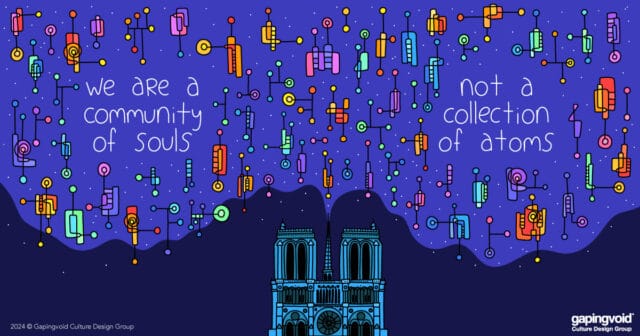
I just got the following comment on gapingvoid:
Hugh,
Since you’re rubbing elbows with the Blue Monster, maybe you could ask him who talked him into slowing computers to a crawl by loading Vista with DRM and those bizarre and tortuous security protocols.
I know two people who have bought new computers lately. One, the president of my company, bought a Vista equipped computer for home use. As a result, our company will hang on to our old computers as long as possible and then consider switching to Linux. True, it’s only one small company, but I imagine this same scene is being played out everywhere.
Another friend bought a Linux machine for multi-media. He raves about the speed he gets from it because of the reduced clutter in the operating system.
Is marketing a conversation? Who the hell was the Blue Monster listening to when he dreamed up Vista?
Though one could easily interpret this as “negative”, I’m starting to really like comments like this one. Why? Because the guy is certainly entitled to opinion, and perhaps just as importantly, I know for a fact people inside Microsoft will see it the comment eventually, and that it will be discussed internally. And then slowly but surely, good things will start to happen.
In other words, I see these type of comments simply as a symptom of something much larger going on, which my friend JP Rangaswami nailed down superbly last March:
People want Microsoft to change. That is the essence of what made the Blue Monster such a hit, it was a way of people outside Microsoft telling people in Microsoft of the intense need for change.
JP then goes on to explain the importance of bloggers in the whole equation:
When a company achieves critical mass in terms of “external” bloggers, there is no longer an inside or an outside. Blogs do not support hierarchies or vertical silos, they tend to be lateral and networked and and all-over-the-place. Blogs are not respecters of walls, whether inside the firm or at the firm’s boundaries.
Not having an inside or an outside. That’s how tomorrow’s customers will figure which of today’s companies to bless.
Amen. Hence the Porous Membrane etc.
From some of the recent talks I’ve had with Microsoft, I’m starting to see more and more people internally beginning to believe a simple truth: That if Microsoft wishes to change the world, then changing themselves is also, most definitely, a big part of the equation.
And yes, that last sentence will also apply to any other company, large or small.
[Addendum:] Recent remark from an older techie friend of mine:
“People who hate Microsoft are either clueless or naive about what running a business was actually like, before they were around.”
Discuss.
[Related:] Interesting post by JP Rangaswami about why Microsoft is buying minority stakes in companies, as opposed to buying them outright, like they used to be in the habit of etc.



